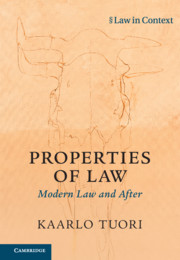Epilogue
Incertitude
Published online by Cambridge University Press: 03 September 2021
Summary
In this essay, my aspiration has been to present a legal-theoretical recapitulation of law; a reflexion theory of law, as Luhmann put it. I have resorted to two main methodological devices, which also imply perspectival choices. First, I have opted for discussing law in the framework of an ideal-typical modern state legal regime. The choice of modern state law as the perspectival premise has been motivated by its high grade of differentiation. This facilitates elaborating analytical distinctions which can then be applied to exploring other types of law too. In modern state law, legal norms have become detached from sociolegal practices and, due to their objectivation and dissemination in writing, embarked on a trajectory of their own, although never losing contact with sociolegal practices as law’s social modes of existence. Parallel to the detachment of norms from practices, second-order, specialised, legal practices have emerged. First-order sociolegal practices remain the chief locus of law’s realisation, while second-order practices monitor and react to disturbances in that realisation, and assume the tasks of (re)producing the normative legal order. The differentiation within sociolegal practices finds its parallel in the normative dimension in the division of primary and secondary rules, addressing, respectively, first- and second-order sociolegal practices. Differentiation of specialised second-order legal practices enhances the role of legal professionals and the importance for those practices of professional legal Vorverständnis, informed by the prevailing legal culture. Legal culture displays normative, conceptual, and methodological components. It also includes a legal language where legal concepts function as the vocabulary and patterns of legal argumentation and reasoning as the grammar.
- Type
- Chapter
- Information
- Properties of LawModern Law and After, pp. 268 - 286Publisher: Cambridge University PressPrint publication year: 2021



